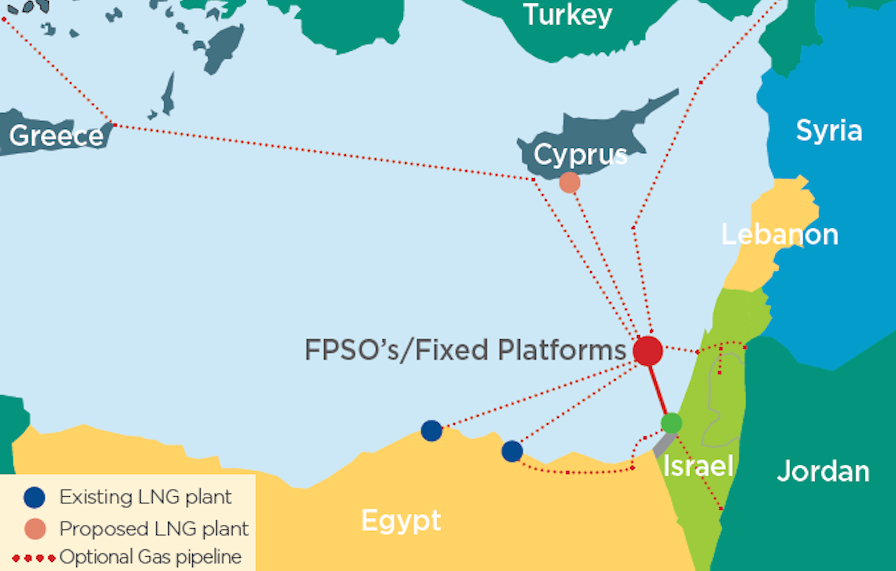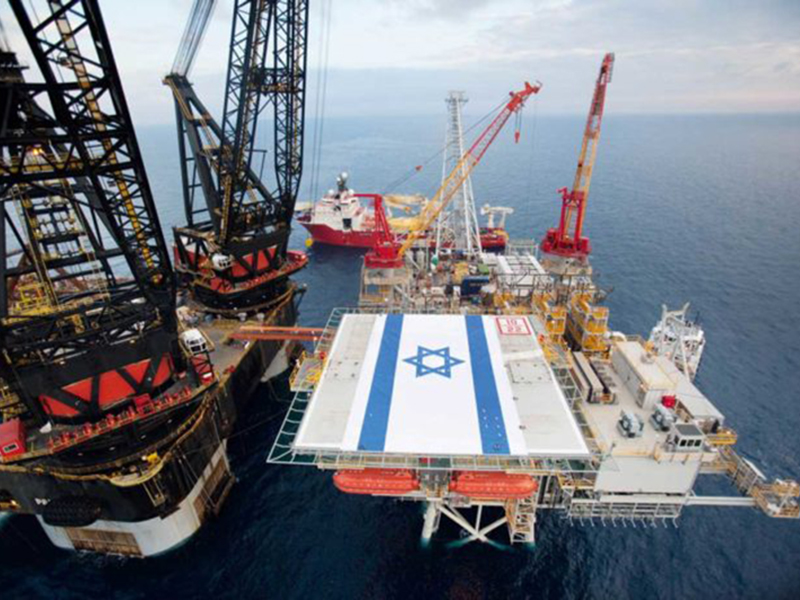The Third Gas Pipeline from ‘Israel’ to Egypt: Implications for National Security

“Israel” has been importing gas from Egypt until 2012.
Despite plans to ramp up production from its Zohr gas field, which saw a decline in output in 2023 and 2024, Cairo stunned everyone with a new agreement with Tel Aviv. This deal will see the extension of a third Israeli gas pipeline to Egypt, boosting imports by 17%.
This third pipeline joins two others: the Eastern Mediterranean Gas (EMG) subsea pipeline connecting “Israel” (Ashkelon) to Egypt (Arish), and the East Gas pipeline, jointly owned by the Egyptian company Dolphinus, ‘Israel's Delek,’ and U.S.-based Noble Energy.
The construction of the pipeline coincided with a decline in Egypt's gas production, the halt of exports, and plans to transform Egypt into a regional gas hub for Europe. Now, Egypt consumes all of its own production and imports from “Israel” as well.
This development makes Egypt increasingly dependent on Israeli gas, threatening its national security. If “Israel” were to wield this “weapon” in the future, it could potentially cut off Egypt's supply and disrupt its factories.
“Israel” imported gas from Egypt until 2012, when the agreement was terminated following the January 2011 revolution.
As Egypt’s gas production declined and “Israel” started extracting natural gas from its Tamar and Leviathan fields, Tel Aviv became, starting in January 2020, a major supplier of natural gas to Egypt.
A Concerning Dependence
Israeli Energy Minister Eli Cohen announced the creation of the third pipeline, confirming that on December 19, 2024, the Israeli government approved the plan. However, Cohen, a former head of Mossad, also hinted at a political motive behind exporting gas to Egypt.
He stated that the goal was to double the amount of gas Egypt receives, which currently stands at about 10 billion cubic meters, emphasizing that “Israeli energy is a political force.”
“Natural gas is a strategic asset that strengthens our economic and political position globally, and particularly in the Middle East,” he added.
A senior Egyptian government official told al-Arabiya on December 24, 2024, that the Egyptian Natural Gas Holding Company (EGAS) is working to increase daily gas imports from “Israel” by around 170 million cubic feet.
The official explained that Egypt’s Ministry of Petroleum expects to increase natural gas imports from “Israel” by about 17% starting January 2025.
“Israeli gas flows in December 2024 ranged between 980 million and one billion cubic feet per day, and the Ministry of Petroleum aims to reach 1.15 billion cubic feet per day in January 2025,” he said.
Due to the decline in output from the Zohr field, Egypt has halted any gas exports and redirected production for domestic use, increasing the strain on its energy bill. As a result, fuel prices were raised three times in 2024, and power cuts lasted 2 to 4 hours daily for nearly a year.
Since January 2020, “Israel” has become Egypt's key natural gas supplier, with production from the Tamar and Leviathan offshore fields starting at 5 billion cubic meters annually and rising to 10 billion.
This deal, valued at $15 billion, involved a contract between Noble Energy (acquired by Chevron in 2020), Delek Drilling, and Egypt’s Dolphinus Holding.

Why a Third Pipeline?
The third pipeline was first announced in January 2021, with the goal of easing congestion in “Israel’s southern gas network.” It was designed to enhance the flows from the EMG subsea pipeline linking Ashkelon to Arish in Egypt, increasing capacity from 600 million to 800 million cubic feet per day.
Initially, the project was scheduled for completion by the end of 2022, but it faced delays due to a malfunction in the pipe-laying vessel. Further setbacks followed Operation al-Aqsa Flood repercussions, as reported by MEES.
Reuters revealed in 2021 that “Israel” and Egypt were in talks about a new land pipeline. The Israeli Energy Ministry confirmed in a statement that it was studying the construction of a third pipeline to boost gas exports to Egypt, amid Cairo’s growing reliance on Israeli gas.
According to Israeli industry sources cited by Reuters, the pipeline, which will connect “Israel’s” and Egypt’s gas networks through northern Sinai, is estimated to cost around $200 million. It’s expected to increase Israeli exports by about 3 to 5 billion cubic meters annually.
This third pipeline, along with plans for a second subsea pipeline to Egypt in the coming years, will reinforce “Israel’s position” as a central energy hub in the Eastern Mediterranean. This shift contrasts with Egypt’s earlier ambitions to become a regional energy center, as it has now become more of a consumer and distributor of Israeli gas.
In July 2023, The Times of Israel reported the start of construction for the third pipeline from Leviathan field, with a consortium of companies, including NewMed Energy, Chevron Mediterranea Ltd., and Ratio Energy.
However, in October 2024, U.S. oil giant Chevron, the operator of the Leviathan field, announced it would suspend work on the third subsea pipeline for six months, until April 2025, due to the ongoing Israeli war on Gaza.
Finally, on December 19, 2024, the Israeli government approved the construction of the third pipeline, aiming to double the amount of gas Egypt receives from Tel Aviv. The third pipeline is expected to boost gas flows from “Israel” to Egypt by 200 million cubic feet per day once the Ashdod/Ashkelon subsea pipeline, measuring 46 kilometers in length, is completed in May 2025, just ahead of Egypt’s peak summer gas demand.

Who Scored the Goal?
Amid a sweeping public relations push, Egypt has been positioning itself as a future “regional energy hub.” On February 21, 2018, head of the Egyptian regime Abdel Fattah el-Sisi declared to the nation, “We’ve scored a goal in the gas sector, and we will become a regional energy hub.”
At the time, an agreement was signed between three Egyptian, Israeli, and American companies to purchase natural gas from “Israel’s Tamar and Leviathan fields,” which would be delivered to Egypt for re-export after liquefaction at the Damietta and Idku terminals.
However, Israeli Prime Minister Benjamin Netanyahu called it “a holiday for Israel,” noting that the deal would bring billions of dollars to the Israeli treasury. This led some analysts to conclude that “Israel”, not Egypt, was the true beneficiary of the “goal.”
Egypt’s losses deepened as the country transitioned from being a gas exporter to becoming a net importer of gas from “Israel,” compounded by declining domestic production.
Once producing 9 billion cubic feet per day at the time of its discovery in 2015, Egypt’s offshore Zohr field saw production drop to just 5.82 billion cubic feet by 2023, and further decline to 2 billion cubic feet in April 2024, according to Attaqa Platform. This shift pushed the field from being the largest discovered in the Mediterranean to third place, after “Israel's Leviathan and Tamar fields.”
As a result, Egypt’s LNG exports plummeted by more than 50%, falling to 3.7 million metric tons in 2023, down from the previous year, based on S&P Global data.
To cover the shortfall, as domestic demand rose to 6.1 billion cubic feet per day while Egypt's production could only meet 5 billion, Egypt sharply increased imports from “Israel.” Imports surged more than threefold over three years, reaching 8.6 billion cubic meters in 2023 and nearly 10 billion in 2024, according to Egyptian and Israeli statistics.
This dependency on Israeli gas to power homes and industries puts Egypt’s national security at risk, especially if “Israel” were to cut off supplies for any reason.
The threat to Egypt’s national security deepened, underscoring that it was “Israel,” not Egypt, scoring the real “goal.” Investigative reporting by Mada Masr revealed that a company linked to Egyptian intelligence was involved in importing gas from “Israel”—contrary to the agency's mandate to safeguard the country’s security.
On February 16, 2024, Egypt signed a new deal with “Israel” to import an additional 4 billion cubic meters of natural gas annually from the Israeli Tamar field, co-owned by Israeli, American, and Emirati interests. The 11-year agreement, set to start in July 2025, raised serious concerns.
The deal was brokered by Blue Ocean, a company acting as a front and partner for Egypt's General Intelligence Service through a network of shell companies registered abroad, established specifically for this purpose, according to journalist Hossam Bahgat.
A chilling preview of this threat occurred in October 2023 when “Israel” cut off gas supplies to Egypt entirely. The decision followed concerns about potential Palestinian Resistance attacks on the Tamar field, halting gas production completely. Daily gas flows dropped from 800 million cubic feet to zero.
This disruption led to daily power outages in Egypt lasting 2 to 4 hours and factory shutdowns. It underscored Egypt’s growing vulnerability, revealing that the country has become economically dependent on “Israel” for its energy needs.
Sources
- Israel-Egypt Gas Volumes To Rise From May 2025 With Pipeline Start-Up
- EXCLUSIVE Israel considering new pipeline to boost gas exports to Egypt
- Energy companies to build third pipeline from Israel’s Leviathan gas field
- Egypt prepares for 17% increase in Israeli gas imports next January [Arabic]
- Postponing Egypt's Increase in Israeli Gas Imports by Urgent Decision [Arabic]
- Why Did Egypt Shift from Exporting Natural Gas to Importing It? [Arabic]
- Who Buys Israel's Gas? A Company Owned by Egyptian Intelligence [Arabic]










